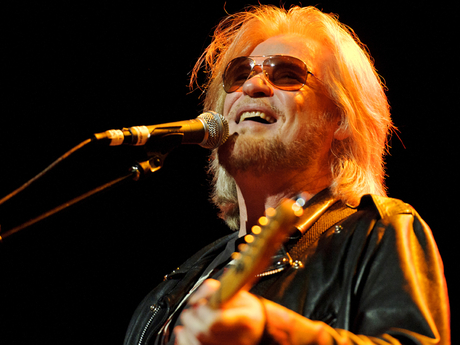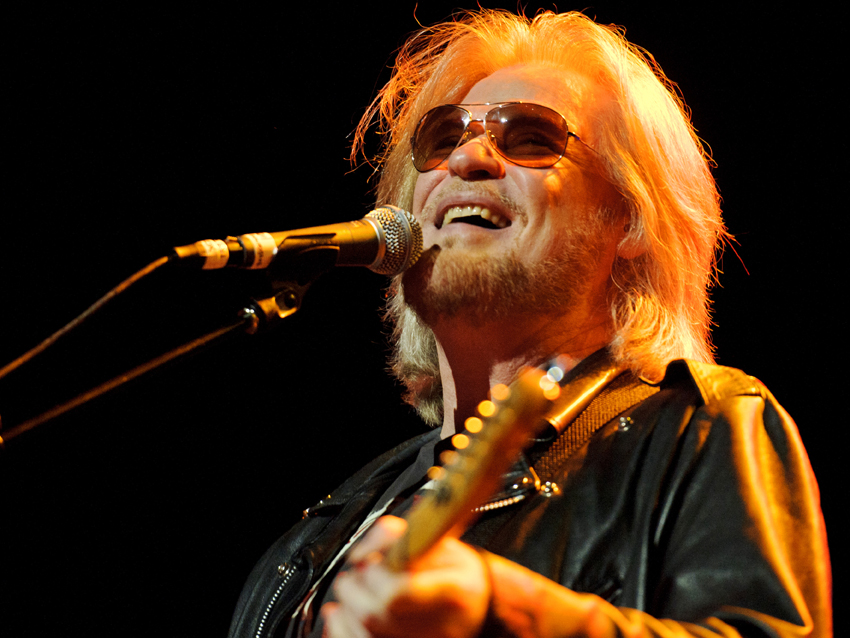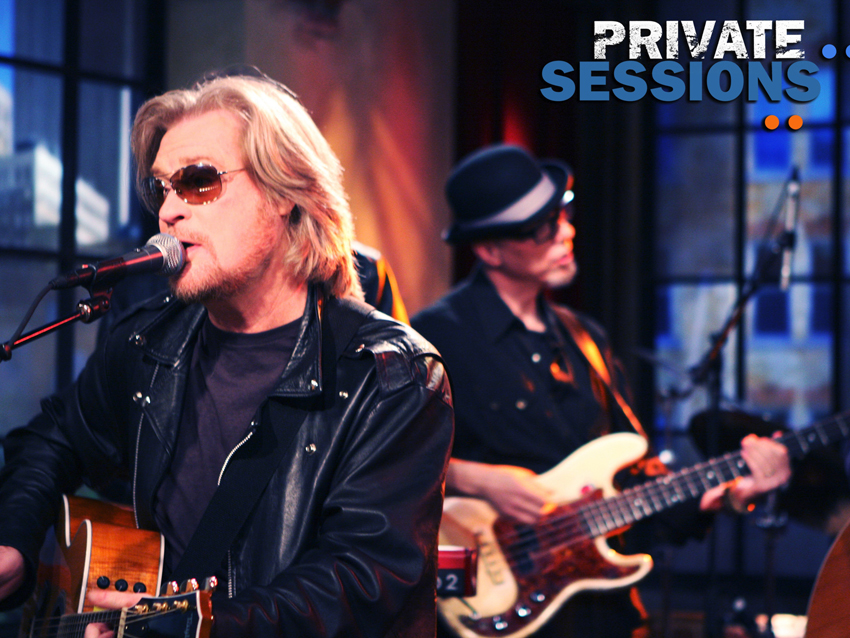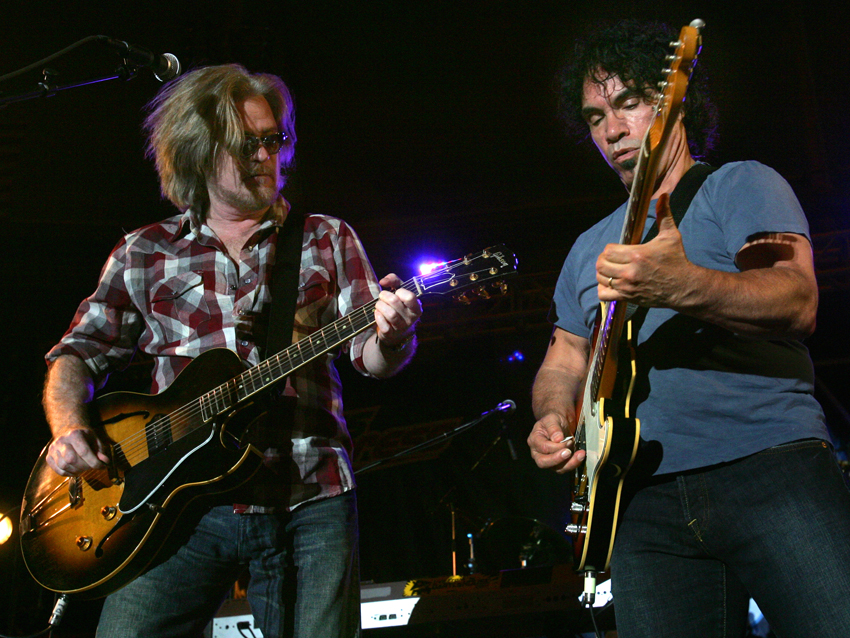

Daryl Hall hits a creative peak on his new solo record, Laughing Down Crying. © Â Chris Schwegler/Retna Ltd./Corbis
"I'm very proud of this record," says Daryl Hall about his upcoming solo release, Laughing Down Crying. "A lot of things went down during the making of it, and I think that only increased the intensity of the emotions in the songs. Through it all, I was able to make the statement that I wanted to make."
Hall isn't being melodramatic: the events that occurred during the past couple of years ranged from the blissful to the tragic. On the upside, the man who once sang, somewhat ironically, about being a 'family man' actually became one, marrying Amanda Aspinall and become a stepdad to her two children.
But it was the February 2010 death of T-Bone Wolk, one of the music industry's A-list bassists and multi-instrumentalists, who had been an integral part of Hall & Oates and would also serve as Daryl's musical director, that sent the singer-songwriter into a tailspin..
"I'm still getting over the loss of T-Bone," Hall says. "I don't know if you ever really 'get over it,' because you're always going to miss that person. You just find ways to deal with it. Staying busy helps, and luckily I have a lot to occupy my mind."
He's got that right. At the age of 64, when most musicians are either retiring or playing the oldies circuit, Daryl Hall is hotter than ever and breaking new ground. His web-based music show, Live From Daryl's House, which he created and hosts, is a smash and will soon be not-so-web-based: it's moving to TV syndication. "You hope for these things to work, but it's very sweet when they do," he says. "I have a great time meeting and playing with so many artists on the show. The audience can tell we're enjoying ourselves."
And Hall, who has sold something like a gazillion records during his career, hits a creative peak with Laughing Down Crying (due out 27 September), a luminous, easy-to-adore collection of songs that runs the gamut from edgy, acoustic pop-rock to lush R&B to down-home blues to slightly skewed prog rock. "It's all a journey," he says. "The songs work individually, but together they tell a real story."
Want all the hottest music and gear news, reviews, deals, features and more, direct to your inbox? Sign up here.
MusicRadar sat down with Daryl Hall recently to talk about Laughing Down Crying, his approach to guitar playing and the impact of Live From Daryl's House. We began the conversation by asking Hall about his good friend.
It feels only right to talk about T-Bone.
"I'm happy to talk about T-Bone. He was such a special guy. He was my best friend in the whole world. He was my musical advisor and teacher. He was one of the most accomplished and consummate musicians that I have ever had the pleasure of working with.
"As far as I'm concerned, he was the world's best bass player. He was a unique and unbelievable guitar player, and played like nobody else. He was an amazing keyboard player, too. He was something of a singer, although that probably wasn't his strong suit - still, he could get his point across.
"His skills were so deep. When it came to guitar playing, he left me in the dust. He left so many people in the dust. T-Bone was the kind of guy you just wanted to sit and listen to. So many people who we've played with or have appeared on the show would just sit or stand there, marveling at the guy. He really was that good.
"Beyond his incredible chops, and this is probably what added to his skills, is that he had a vast knowledge of so many different styles of music. He was unbelievably eclectic. He loved music. He loved studying it. He lived and breathed music of so many genres.
"Of all the people I've ever worked with, he and I truly had a telepathic relationship musically. You hear people say that a lot, but in our case it really was true, and it was profound. It enabled me to do things that I could never do with anybody else."

Hall performing with T-Bone Wolk for A&E's Private Sessions, 2009. © Billy Tompkins/Retna Ltd./Corbis
How would T-Bone push you musically? What exactly would you say you learned from him?
"One thing that I really, really owe him - and I feel as though he's guiding me still - is that he encouraged me when it came to the guitar. See, I started out as a keyboard player. I've been playing keyboards since I was five years old. I came to the guitar quite late - it wasn't until I was in my 20s that I started playing. And I wasn't any good. [laughs] I'm something of a fast learner, but you know how it is when you're tentative on an instrument - it can be frustrating.
"He encouraged me both verbally and musically. He had a way of playing something in such a way that it would enhance what I did, and together our guitar parts would form this beautiful, seamless mosaic. His skills were so superior to mine, but he always made me sound good.
"That's something really important that he brought to me, and I'll never forget it. Now that he's gone, I feel like I've taken some of the things that he used to do but I'm doing them myself. I'm at the point now where I can be T-Bone…to some degree at least. In that way, I feel like he's still with me; he's in my fingers."
The tribute episode you put together was wonderful, particularly how you detailed his love of food.
[laughs] "Yes. Music and food pretty much ran his life."
By the way, what were his 'secret sandwiches'?
"The most prosaic things, man. You could reach into his coat pocket and pull out a meat loaf sandwich. [laughs] I'm not kidding! But you know what? He would make the best meat loaf sandwiches. I can't even describe them. Usually you hear 'meat loaf sandwich' and you know…whatever. But his were great. He could make the best with very little."
Let's get into your new record. You start out with a couple of acoustic-driven rock songs, and then you go in more of an R&B direction.
"That was on purpose. I look at each piece of work as a journey, from song to song, and I really wanted to start off with kind of an unusual version of what I do. The song Laughing Down Crying is not a typical Daryl song. So I wanted to lead with that and then take the listener with me to more of the R&B songs that I'm known for.
"After that, I show off a bit more of my rocky side. I think I got a lot of direction from putting together the boxset that we did last year. I looked at my evolution, and I could be objective about it for the first time because I had to list all of my music, and I listened to it like, 'OK, what's this guy all about?' The boxset allowed me to look at the album and figure out the musical journey."
The sound of the acoustic guitars is very impressive. One can actually hear the vibrations of the strings, the sound of the wood…
"Ahhh! Thank you. Boy, now you're making me feel good. [laughs] See, what you're hearing is really me playing. I used to defer to T-Bone and let him play the acoustic guitar parts; I would just play supplemental parts. Now I had to take T-Bone's role on myself, so you're hearing the way I play, all the way.
"I do have my own studio, but I was never happy with the acoustic guitar sound, so I sort of got a new studio - Paul Pesco, who is my new guitar player, took over a place that's not too far from here. The room is really extraordinary.
"We miked the guitars slightly different. One of my co-producers, Greg Bieck, was working with Marty Stuart's people, and he learned a few things about how Marty mikes his acoustic guitars. There's above miking, there's slightly mid-distance miking… The main thing was positioning in relation to the soundhole."
What acoustics did you play?
"One of them is T-Bone's old Hummingbird that I inherited. That's actually the main guitar sound. The other guitar is a Martin D-28. The combination of the two really sounds great. I love to double acoustic guitars."
Let's talk about your singing. You never overpower a song. You sing powerfully, but you don't showboat.
"Hmmm. That's interesting. I don't know if I think about it consciously. It just might be my style. I think because I write the songs I have a different approach. I don't like showboating. I was never a fan of showing off. That kind of vocalizing never impressed me.
"As a singer, I float around. I'm kind of scatty, bouncing around a lot. I try to adapt to what's going on around me in the song and the arrangement. If I'm singing a real gutbucket soul song, I might kick it more. You know how a sax player might play differently in a certain part of a song? I'll do that. I try to use my voice like an instrument."
In your songwriting, how much do you push yourself physically? Guitarists have a habit of going from D to G to A…it's comfortable, almost like muscle memory. How do you try to break free of that?
"That's a very interesting question. I tend to go to certain chords as most writers do. But because I write on keyboards as well as guitar, it sometimes gives me surprises. I'll start a song out on the keyboard and bring it to the guitar, and then I'm in a different place. If I do go for something that's familiar, I'll try to expand on it."
Lifetime Of Love is a beautiful song. Autobiographical?
"Oh yeah. Sure. All the songs are autobiographical in various ways. You know, I've gone through a lot of changes during the past few years - the whole world's gone through incredible changes. All of the songs reflect how I see things and feel about things.
"Lifetime Of Love…it describes how I feel about somebody. Simple as that. It's very much in the vein of a song like Sara Smile. It talks about the ups and downs, the ins and outs, the sideways…but hey, we got it right."
Message To Ya is classic soul all the way - and what a guitar riff!
"Yeah, that's Paul Pesco. Here's what happened: After T-Bone passed, I was lost. I didn't have a clue what to do. He died four days into the recording. We were two songs in, and then it all fell apart. I was flailing around, as somebody does in such a situation. But then I thought of Paul Pesco.
"Paul has played guitar in my band, and he's someone I've known for years and years. He's played with T-Bone; he's been part of our sound. He understood where I was coming from. So I put a call in to him - he was actually on tour with Toni Braxton; they were in Indonesia - and when I spoke to him, he said that he had heard about T-Bone, and he said, 'Whatever you need, I'm there. I'll leave right now if you want me to.' That was an incredibly comforting feeling.
"Paul came back to America, and the first thing he did - and I think he wanted to break the ice - was to play that guitar lick. It so brightened my day! Here was a guy, he walks in and he's got some ammunition. We sat down and we wrote that song together. That was the beginning of the second phase of this project, and the beginning of an optimistic feeling - as much as one can be optimistic in the face of something like this."
Problem With You is the last track that T-Bone ever recorded. His guitar playing is superb. Had you finished your parts before he died?
"No. What I tend to do is, I'll sketch out words to music, and sometimes those words are both real and gibberish - I'll revise them as I go along. What I sang, and what he played to, is the melody with slightly different words. He was playing the guitar to what I was singing, so it was a real dialogue.
"I…I just think he played so amazingly well on that song. He knew how to play, man. I love it. He ends it with a 'domp-domp!' and then he says, 'That's what I'm talkin' about!' Really great. Three hours later…he was gone."
Her certainly was great. The song Wrong Side Of History is another strong track.
"Actually, that's the first song we cut, so T-Bone played bass on the prototype to that - amazingly powerful bass. Lyrically, the song concerns society. It's about people who have lost the ability to have empathy, who become the egomaniacal kings of their own little worlds. Nobody really cares about what other people think anymore; they're all about themselves. We've become a very selfish society, so I'm saying, 'You're all on the wrong side of history if you think that way.'"
Let's go back to something we were talking about before, how after the first couple of cuts kick into what many people would call the 'Daryl Hall sound' or even the 'Hall & Oates' sound.
"Yeah. Again, on purpose. My motto when making this record was 'Don't fear the '80s.' [laughs] For years, especially during the '80s, people would snipe at me for the string of songs that have now become, for lack of a better word, 'classics,' I tried to shy away from that sound. But then I decided to just go with it…so I set up the sequence in just that way to hit you with that sound. I think I can be unapologetic about it all now."
And in addition to a classic string of hits, now you have a bona fide hit show. When you started Live From Daryl's House, did you have any idea that it could go this far?
"Uh…I hoped. [laughs] I knew that this was a simple idea - a simple but effective idea. I knew it had potential, but of course, you can never be sure what will happen. But I felt that it was something that the world needed. Everyone wants to see musicians being themselves, without being on stage and posturing - just being real. What do they do when they're by themselves? What do they play, what do they talk about? How they think…how their brains work. I don't think that's ever really been shown to the world. I wanted to do that.
"In starting this, I felt as though I was a pioneer on the internet, like one of the guys who started TV back in the '50s. We have this new medium, but how do we get people to watch it? Well, you give them something real. I sort of had in the back of my mind that it could go to television eventually…"

The best-selling duo of all time. Hall with John Oates, Florida, 2010. © Cliff Welch/Icon SMI /Corbis
And you were proved right. The show is going into syndication. You're going to be on Channel 11 in New York.
"That's right, on WPIX. We'll be on right after Saturday Night Live, which is a good spot to be in. We'll be on all over the country, and we're talking it outside the country, as well. I'll be very curious to see how it's received off the internet, because it's very much an internet show. It's maybe the first one to jump from the internet to TV."
You're kind of like the Wayne's World that really made it - although they were cable access.
[laughs] "That's exactly right. I like that. That's sort of what it was like. Me and T-Bone were like Wayne's World." [laughs]
What's next for Hall & Oates? Are you and John planning anything?
"Well…no. I mean, John is never far away. He and I tour regularly. We have our body of work, and we're very happy with it. Those songs are great to play. We try not to confuse what we've done together with what we continue to do together and what we're doing separately. Creatively, I think we want to go in different directions as far as new music. But who knows? If John and I want to go into the studio together, we will."
Last question: When John shaved off his moustache, what was your reaction?
[laughs] "You have to understand, when he did that, he also shaved his head. It was a statement. He was a shaved-head, bald-lipped motherfucker! [laughs] I think he just got a little tired of being 'the guy with the moustache,' and he wanted to be known for being himself. It was kind of a statement for both of us, in a way. He wanted to make some changes in his life. It was bold."
Joe is a freelance journalist who has, over the past few decades, interviewed hundreds of guitarists for Guitar World, Guitar Player, MusicRadar and Classic Rock. He is also a former editor of Guitar World, contributing writer for Guitar Aficionado and VP of A&R for Island Records. He’s an enthusiastic guitarist, but he’s nowhere near the likes of the people he interviews. Surprisingly, his skills are more suited to the drums. If you need a drummer for your Beatles tribute band, look him up.
